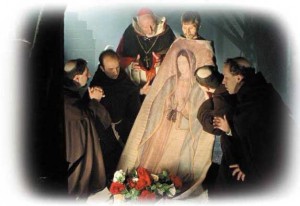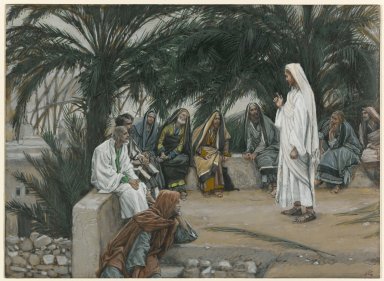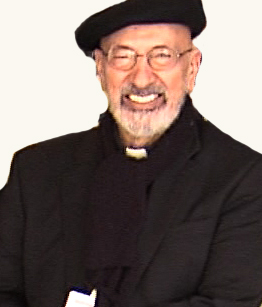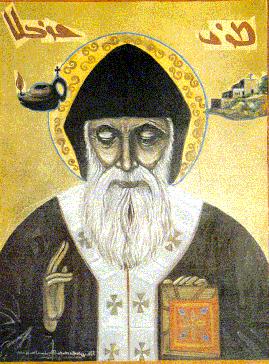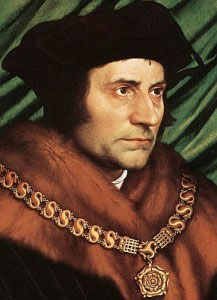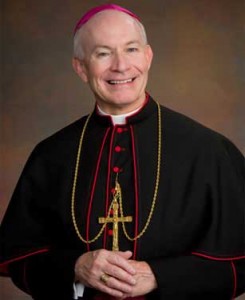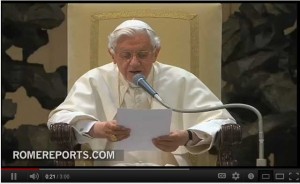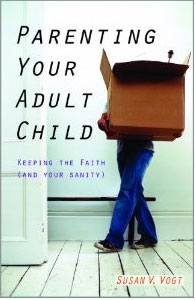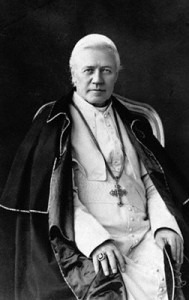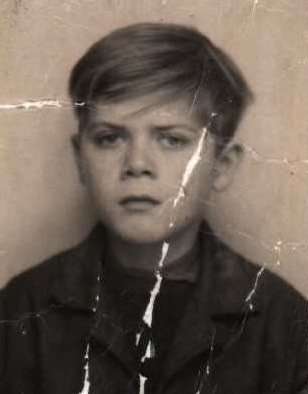Please visit the Discerning Hearts Our Lady of Guadalupe page for the text and audio for the remaining days.
Day Seven
Mystical Rose, your miraculous signs of Castilian roses in winter and your image on the tilma of Juan Diego led to the conversion of eight million Aztec people to Catholicism in just seven years. Mary, Mother of the Americas, intercede again for your children in the Americas, and convert the hearts of all who deny the sanctity of every human life.
Our Father … Hail Mary … Glory be …
Tags: catholic, catholic podcast, catholic prayer, cathollc spirituality, children, Day Seven, juan diego, miraculous signs, mother of the americas, Mystical Rose, our lady of guadalupe
This entry was posted on Tuesday, December 9th, 2014 at 1:42 am
You can follow any responses to this entry through the RSS 2.0 feed.
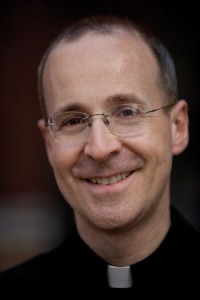
Join Bruce and I, as we discuss the life of both St. Maximilian Kolbe and St. Teresa Benedicta of the Cross with Fr. James Martin, S.J.
[powerpress]
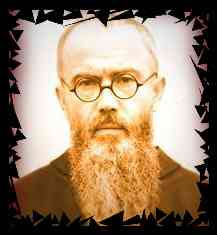 Just look at his eyes…every picture of St. Maximillan Kolbe has those fiery prophetic eyes.
Just look at his eyes…every picture of St. Maximillan Kolbe has those fiery prophetic eyes.
Fueled with the fires of grace from his great love for and devotion to the Blessed Virgin Mary, St. Maximilian was a missionary extraordinaire. A publisher who was a leader in the yet to be defined “New Evangelization”.
They say the blood of the martyrs becomes the seed for the Church. In the case of St. Maximilian, Catholic publishing and broadcasting…all media, would be enriched by his intercession and example. His courage in speaking out against the horrors of the Nazi regime is what placed him in the death camp; it would be his love for Christ and his neighbor that would lead him to give his life for another. And that is what earned him the martyr’s crown.
“In order to discourage escapes, Auschwitz had a rule that if a man escaped, ten men would be killed in retaliation. In July 1941 a man from Kolbe’s bunker escaped. The dreadful irony of the story is that the escaped prisoner was later found drowned in a camp latrine, so the terrible reprisals had been exercised without cause. But the remaining men of the bunker were led out.
‘The fugitive has not been found!’ the commandant Karl Fritsch screamed. ‘You will all pay for this. Ten of you will be locked in the starvation bunker without food or water until they die.’ The prisoners trembled in terror. A few days in this bunker without food and water, and a man’s intestines dried up and his brain turned to fire.
The ten were selected, including Franciszek Gajowniczek, imprisoned for helping the Polish Resistance. He couldn’t help a cry of anguish. ‘My poor wife!’ he sobbed. ‘My poor children! What will they do?’ When he uttered this cry of dismay, Maximilian stepped silently forward, took off his cap, and stood before the commandant and said, ‘I am a Catholic priest. Let me take his place. I am old. He has a wife and children.’
Astounded, the icy-faced Nazi commandant asked, ‘What does this Polish pig want?’
Father Kolbe pointed with his hand to the condemned Franciszek Gajowniczek and repeated‘I am a Catholic priest from Poland; I would like to take his place, because he has a wife and children.’
Observers believed in horror that the commandant would be angered and would refuse the request, or would order the death of both men. The commandant remained silent for a moment. What his thoughts were on being confronted by this brave priest we have no idea. Amazingly, however, he acceded to the request. Apparantly the Nazis had more use for a young worker than for an old one, and was happy to make the exchange. Franciszek Gajowniczek was returned to the ranks, and the priest took his place.
Gajowniczek later recalled:
 I could only thank him with my eyes. I was stunned and could hardly grasp what was going on. The immensity of it: I, the condemned, am to live and someone else willingly and voluntarily offers his life for me – a stranger. Is this some dream?
 I was put back into my place without having had time to say anything to Maximilian Kolbe. I was saved. And I owe to him the fact that I could tell you all this. The news quickly spread all round the camp. It was the first and the last time
For that such an incident happened in the whole history of Auschwitz. A long time I felt remorse when I thought of Maximilian. By allowing myself to be saved, I had signed his death warrant. But now, on reflection, I understood that a man like him could not have done otherwise. Perhaps he thought that as a priest his place was beside the condemned men to help them keep hope. In fact he was with them to the last.’‘
A personal testimony about the way Maximilian Kolbe met death is given by Bruno Borgowiec, one of the few Poles who were assigned to render service to the starvation bunker. He told it to his parish priest before he died in 1947:
 ‘The ten condemned to death went through terrible days. From the underground cell in which they were shut up there continually arose the echo of prayers and canticles. The man in-charge of emptying the buckets of urine found them always empty. Thirst drove the prisoners to drink the contents. Since they had grown very weak, prayers were now only whispered. At every inspection, when almost all the others were now lying on the floor, Father Kolbe was seen kneeling or standing in the centre as he looked cheerfully in the face of the SS men.
Father Kolbe never asked for anything and did not complain, rather he encouraged the others, saying that the fugitive might be found and then they would all be freed. One of the SS guards remarked: this priest is really a great man. We have never seen anyone like him ..
Two weeks passed in this way. Meanwhile one after another they died, until only Father Kolbe was left. This the authorities felt was too long. The cell was needed for new victims. So one day they brought in the head of the sick-quarters, a German named Bock, who gave Father Kolbe an injection of carbolic acid in the vein of his left arm. Father Kolbe, with a prayer on his lips, himself gave his arm to the executioner. Unable to watch this I left under the pretext of work to be done. Immediately after the SS men had left I returned to the cell, where I found Father Kolbe leaning in a sitting position against the back wall with his eyes open and his head drooping sideways. His face was calm and radiant ..’
 So it was that Father Maximilian Kolbe was executed on 14 August, 1941 at the age of forty-seven years, a martyr of charity. The death certificate, as always made out with German precision, indicated the hour of death 12.30.
Father Kolbe’s body was removed to the crematorium, and without dignity or ceremony was disposed of, like hundreds of thousands who had gone before him, and hundreds of thousands more who would follow.
The heroism of Father Kolbe went echoing throughAuschwitz. In that desert of hatred he had sown love. A survivor Jozef Stemler later recalled: ‘In the midst of a brutalization of thought, feeling and words such as had never before been known, man indeed became a ravening wolf in his relations with other men. And into this state of affairs came the heroic self-sacrifice of Father Kolbe.’ Another survivor Jerzy Bielecki declared that Father Kolbe’s death was ‘a shock filled with hope, bringing new life and strength … It was like a powerful shaft of light in the darkness of the camp.’
The cell where Father Kolbe died is now a shrine. Maximilian Kolbe was beatified as Confessor by Paul VI in 1970, and canonized as Martyr by Pope John Paul II in 1981.†– from St. Maximillian Kolbe, saint of Auschwitz
Tags: auschwitz, blessed virgin mary, catholic, catholic podcast, catholic prayer, catholic priest, cathollc spirituality, children, edith stein, father kolbe, fr. james martin, holacaust, James Martin, martyrs, maximillan kolbe, Maximillian Kolbe, nazi death camp, st maximilian
This entry was posted on Thursday, August 14th, 2014 at 6:01 pm
You can follow any responses to this entry through the RSS 2.0 feed.
“Do not return evil for evil”
[powerpress]
an excerpt from today’s reflection by Don Schwager:
What makes a disciple of Jesus Christ different from everyone else? What makes Christianity distinct from any other religion? It is grace – treating others, not as they deserve, but as God wishes them to be treated – with loving-kindness and mercy. Only the cross of Jesus Christ can free us from the tyranny of malice, hatred, revenge, and resentment and gives us the courage to return evil with good. Such love and grace has power to heal and to save from destruction. The Lord Jesus suffered insult, abuse, injustice, and death on a cross for our sake. Scripture tells us that the blood of Jesus Christ cleanses us from all sin and guilt (Matthew 26:28; Ephesians 1:7, I John 1:7, Revelation 1:5). Since God has been merciful towards us through the offering of his Son, Jesus Christ, we in turn are called to be merciful towards our neighbor, even those who cause us grief and harm. Do you know the power and freedom of Christ’s redeeming love and mercy?
“O merciful God, fill our hearts, we pray, with the graces of your Holy Spirit; with love, joy, peace, patience, gentleness, goodness, faithfulness, humility, and self-control. Teach us to love those who hate us; to pray for those who despitefully use us; that we may be the children of your love, our Father, who makes the sun to rise on the evil and the good, and sends rain on the just and on the unjust. In adversity grant us grace to be patient; in prosperity keep us humble; may we guard the door of our lips; may we lightly esteem the pleasures of this world, and thirst after heavenly things; through Jesus Christ our Lord. (Prayer of Anselm, 1033-1109)
for the full reflection visit : Daily Reading and Meditation
Tags: catholic, catholic podcast, catholic prayer, cathollc spirituality, children, daily reading, death, don schwager, evil, faith, father, freedom, graces, heaven, holy spirit, humility, injustice, Jesus, jesus christ, joy, Lord Jesus, love, meditation, mercy, prayer, reflection, religion, scripture
This entry was posted on Monday, June 16th, 2014 at 12:45 am
You can follow any responses to this entry through the RSS 2.0 feed.
[powerpress]
The Readings from the feast of St. John of the Cross:
FIRST READINGÂ Â Â Â Â Â Â Â Â Â 1 Corinthians 2:1-10a
When I came to you, brothers and sisters,
proclaiming the mystery of God,
I did not come with sublimity of words or of wisdom.
For I resolved to know nothing while I was with you
except Jesus Christ, and him crucified.
I came to you in weakness and fear and much trembling,
and my message and my proclamation
were not with persuasive words of wisdom,
but with a demonstration of spirit and power,
so that your faith might rest not on human wisdom
but on the power of God.
Yet we do speak a wisdom to those who are mature,
but not a wisdom of this age,
nor of the rulers of this age who are passing away.
Rather, we speak God’s wisdom, mysterious, hidden,
which God predetermined before the ages for our glory,
and which none of the rulers of this age knew
for, if they had known it,
they would not have crucified the Lord of glory.
But as it is written:
What eye has not seen, and ear has not heard,
and what has not entered the human heart,
what God has prepared for those who love him,
this God has revealed to us through the Spirit.
GOSPELÂ Â Â Â Â Â Â Â Â Â Luke 14:25-33
Great crowds were traveling with Jesus,
and he turned and addressed them,
“If anyone comes to me without hating his father and mother,
wife and children, brothers and sisters,
and even his own life,
he cannot be my disciple.
Whoever does not carry his own cross and come after me
cannot be my disciple.
Which of you wishing to construct a tower
does not first sit down and calculate the cost
to see if there is enough for its completion?
Otherwise, after laying the foundation
and finding himself unable to finish the work
the onlookers should laugh at him and say,
This one began to build but did not have the resources to finish.’
Or what king marching into battle would not first sit down
and decide whether with ten thousand troops
he can successfully oppose another king
advancing upon him with twenty thousand troops?
But if not, while he is still far away,
he will send a delegation to ask for peace terms.
In the same way,
every one of you who does not renounce all his possessions
cannot be my disciple.”
Tags: children, faith, GOSPEL, work
This entry was posted on Saturday, December 14th, 2013 at 1:54 pm
You can follow any responses to this entry through the RSS 2.0 feed.
Msgr. Esseff shares stories of his time in Lebanon and his experience surrounding the great St. Charbel Makhlouf. Â He also reflects on today’s reading and the importance of depending on God.
Reading 1 EX 16:1-5, 9-15
The children of Israel set out from Elim,
and came into the desert of Sin,
which is between Elim and Sinai,
on the fifteenth day of the second month
after their departure from the land of Egypt.
Here in the desert the whole assembly of the children of Israel
grumbled against Moses and Aaron.
The children of Israel said to them,
“Would that we had died at the LORD’s hand in the land of Egypt,
as we sat by our fleshpots and ate our fill of bread!
But you had to lead us into this desert
to make the whole community die of famine!â€
Then the LORD said to Moses,
“I will now rain down bread from heaven for you.
Each day the people are to go out and gather their daily portion;
thus will I test them,
to see whether they follow my instructions or not.
On the sixth day, however, when they prepare what they bring in,
let it be twice as much as they gather on the other days.â€
Then Moses said to Aaron, “Tell the whole congregation
of the children of Israel:
Present yourselves before the LORD,
for he has heard your grumbling.â€
When Aaron announced this to the whole assembly of the children of Israel,
they turned toward the desert, and lo,
the glory of the LORD appeared in the cloud!
The LORD spoke to Moses and said,
“I have heard the grumbling of the children of Israel.
Tell them: In the evening twilight you shall eat flesh,
and in the morning you shall have your fill of bread,
so that you may know that I, the LORD, am your God.â€
In the evening quail came up and covered the camp.
In the morning a dew lay all about the camp,
and when the dew evaporated, there on the surface of the desert
were fine flakes like hoarfrost on the ground.
On seeing it, the children of Israel asked one another, “What is this?â€
for they did not know what it was.
But Moses told them,
“This is the bread which the LORD has given you to eat.â€
Tags: Charbel Makhlouf, children, Israel, John Esseff
This entry was posted on Wednesday, July 24th, 2013 at 9:05 am
You can follow any responses to this entry through the RSS 2.0 feed.
I leave it to Omar F. A. Gutierrez to write so well on the life,  times, and death of this great saint.
times, and death of this great saint.
You may perhaps remember a scene from Braveheart with Robert the Bruce and his father the leper.
When his son first brings him news about the rebellion led by William Wallace, a commoner, the father instantly devises a plan by which the Bruce clan can gain favor with the Scots and with the English. You get the feeling that Robert is a bit taken aback by the so easy and cold calculation of his rotted father.
He says,
This Wallace. He doesn’t even have a knighthood. But he fights with passion, and he is clever. He inspires men.
His father replies:
You admire him. Uncompromising men are easy to admire. He has courage. So does a dog. But you must understand this: Edward Longshanks is the most ruthless king ever to sit on the throne of England, and none of us, and nothing of Scotland, will survive unless we are as ruthless, more ruthless, than he.
“Uncompromising men are easy to admire.†There is in this world, and it seems more so today, a habit of admiring the compromising fellow. With the ubiquitous dictatorship of relativism that oppresses so many minds, it only makes sense that the general public would take offense at anyone who dares stand up for something with uncompromising stolidity.
The holder of objective truth claims is – so the sages of Manhattan and Melrose Place tell us – no different than the Nazi who insists on the claim to racial purity or the Islamic bomber who literally does cling to his religion and guns.
For this reason, the figure of St. Thomas More, whose feast it is today, can be such a  perplexing figure for the modern mind. And even the Catholic who consumes their breakfast whilst pouring over the latest moto proprio can miss this astonishingly great man. I have to admit having skipped over him in my studies, chalking him up with all the other saints and blesseds who gain God’s favor by losing their heads. But St. Thomas More is more than just a martyr.
perplexing figure for the modern mind. And even the Catholic who consumes their breakfast whilst pouring over the latest moto proprio can miss this astonishingly great man. I have to admit having skipped over him in my studies, chalking him up with all the other saints and blesseds who gain God’s favor by losing their heads. But St. Thomas More is more than just a martyr.
He’s an example of such exquisite lack of compromise that he can teach us a great deal about the Catholic Social Doctrine we long to understand and live out. (more…)
Tags: children, england, english reformation, love, martyr, martyrdom, protestant reformation, tudors
This entry was posted on Saturday, June 22nd, 2013 at 6:32 am
You can follow any responses to this entry through the RSS 2.0 feed.
[powerpress]
Archbishop Lucas offers insights on the US Catholic Catechism for Adults Chapter 29:
Modern technology has enabled us to appreciate how quickly the growing child in the womb takes on human features. This has made many more people aware of the fact that human life begins at conception, the moment that the egg is fertilized. Many common forms of artificial birth control cause abortions by not allowing the newly conceived human child to implant in the mother’s womb. The pro-life commitment of the Church is reflected in her compassion for those who so often regret having had an abortion, her understanding for those who are facing difficult decisions, and her assistance for all who choose life. People who have been involved with an abortion are encouraged to get in touch with the Project Rachel ministry and other ministries that enable them to seek the mercy of God in the Sacrament of Penance and Reconciliation and to obtain the necessary counseling. Pro-life ministries work with expectant mothers who are considering abortion by encouraging them to choose life for their children. They also provide alternatives to abortion through prenatal care, assistance in raising children, and adoption placement services.
United States Conference of Catholic Bishops (USCCB) (2012-04-02). United States Catholic Catechism for Adults (Kindle Locations 5666-5674). United States Conference of Catholic Bishops (USCCB). Kindle Edition.
The Most Reverend George J. Lucas leads the Archdiocese of Omaha.Â
For other episodes in the visit our Archbishop George Lucas page
This programs is based on:
More information can be found here.
We wish to thank the USCCB for the permissions granted for use of  relevant material used in this series.
[ezcc]
Tags: abortion, children, USCCB, work
This entry was posted on Tuesday, June 11th, 2013 at 6:32 am
You can follow any responses to this entry through the RSS 2.0 feed.
[powerpress]
Archbishop Lucas offers insights on the US Catholic Catechism for Adults Chapter 28:
The Fourth Commandment deals with all aspects of family life—parental and filial duties and responsibilities, that is, those of love from child to parent. This includes the duties of children toward their parents, the duties of brothers and sisters toward each other, and the responsibilities of adult children toward their older parents. This Commandment also addresses the duties of government and the duties of citizens (cf. CCC, nos. 2234-2246), including the responsibility of the state and society to foster family values and to strengthen the family in every possible way.
United States Conference of Catholic Bishops (USCCB)
The Most Reverend George J. Lucas leads the Archdiocese of Omaha.Â
For other episodes in the visit our Archbishop George Lucas page
This programs is based on:
More information can be found here.
We wish to thank the USCCB for the permissions granted for use of  relevant material used in this series.
Also we wish to thank Bruce McGregor  for his vocal talents in this episode.
[ezcc]
Tags: Archbishop Lucas, children, family, USCCB
This entry was posted on Tuesday, February 19th, 2013 at 3:24 pm
You can follow any responses to this entry through the RSS 2.0 feed.
“Be Saints!  An invitation from Pope Benedict XVI”, edited by Amy Welborn and illustrated by Ann Engelhart is simply wonderful, a 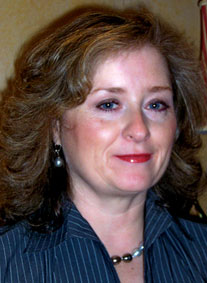 must for every family library.  Marvelous for children and adults alike, this compilation is taken from the talks given by Pope Benedict to children during his 2010 visit to England.  In this conversation with Ann Engelhart, we discuss this work.  We  also discuss the nature of art and beauty, in particular for children, and it’s ability to evangelize.
must for every family library.  Marvelous for children and adults alike, this compilation is taken from the talks given by Pope Benedict to children during his 2010 visit to England.  In this conversation with Ann Engelhart, we discuss this work.  We  also discuss the nature of art and beauty, in particular for children, and it’s ability to evangelize.
[powerpress]
 You can find the book here
You can find the book here
From the description:
In this very colorful book by acclaimed artist Ann Englehart, the Pope’s words come to life as he interacts with the children, showing all children how only God can satisfy the deepest needs of our hearts.
Interspersed are prayers and quotes from various saints including Saint Francis, Saint Ignatius, Mother Teresa, St. Paul, St. Peter and more. They all emphasize that the most important thing we can become in this life is a Saint, a true friend of Jesus.
Tags: amy welborn, Ann Engelhart, children, ignatius press, pope benedict
This entry was posted on Thursday, December 20th, 2012 at 12:39 pm
You can follow any responses to this entry through the RSS 2.0 feed.
“How do we speak to God in our times? How can we communicate the Gospel to open the way to its salvific truth?” The Holy Father offered an answer to these questions in his catechesis during today’s general audience, held in the Vatican’s Paul VI Hall.
“In Jesus of Nazareth”, the Pope said, “we encounter the face of God, descended from Heaven to immerse Himself in the world of mankind and to teach ‘the art of living’, the road to happiness; to free us from sin and to make us true children of God”.
He continued, “speaking about God means, first and foremost, being clear about what we must bring to the men and women of our time. God has spoken to us, … not an abstract or hypothetical God, but a real God, a God Who exists, Who entered history and remains present in history: the God of Jesus Christ … as a response to the fundamental question of why and how to live. Therefore, speaking about God requires a continual growth in faith, familiarity with Jesus and His Gospel, a profound knowledge of God and strong passion for His plan for salvation, without giving in to the temptations of success. … We must not fear the humility of taking small steps, trusting in the leaven that makes the dough rise slowly and mysteriously. In speaking about God, in the work of evangelisation under the guidance of the Holy Spirit, we must return to the simplicity and essential nature of proclamation: the concrete Good News of God Who cares about us, the love of God which Jesus Christ brought close to us, even unto the Cross, and which in the Resurrection opens us to life without end, to eternal life”.
The Pope explained that for St. Paul, communicating the faith did not mean “showing himself, but rather saying openly and publicly what he had seen and heard in his encounter with Christ, and how much his life had been transformed by that encounter. … The Apostle was not satisfied with merely proclaiming the words, but committed his entire existence to the great work of faith. … To speak about God, we must make space for Him, confident that He acts upon our weakness. We must make space for Him without fear, with simplicity and joy, in the profound conviction that the more we place Him – and not ourselves – at the centre of our lives, the more fruitful our communication will be. … This also holds true for Christian communities. They are called to communicate the transforming action of God’s grace, overcoming individualism, closure, selfishness and indifference, bringing the love of God to daily relationships. We must must act to ensure … we always announce Christ, not ourselves”.
“At this point”, the Holy Father continued, we must ask ourselves “how Jesus Christ Himself communicated. Jesus … spoke about His Father (Whom He called ‘Abba’) and about the Kingdom of God, looking with compassion on the discomforts and difficulties of human existence. … From the Gospel we see how Jesus was interested in every human situation He encountered, He immersed Himself in the lives of the men and women of His time, with complete trust in the help of the Father. … In Him, proclamation and life were entwined: Jesus acted and taught, always taking as a starting point His intimate relationship with God the Father. This approach gives fundamental indications to Christians: living in faith and charity is a way of speaking about God in our times, because it demonstrates the credibility of what we say in words through a life lived in Christ. We must take care to grasp the signs of our times, and thereby to identify the potential, the desires and the obstacles we encounter in contemporary culture, in particular the desire for authenticity, the yearning for transcendence, the sensibility for protecting creation. And we must communicate without fear the answer offered by faith in God”.“Speaking about God, therefore, means enabling others to understand through words and acts that God is not a competitor in our existence but rather its true guarantor, the guarantor of the greatness of the human person. Thus we return to the beginning: speaking about God means communicating, with power and simplicity, through words and the life we lead, that which is essential: the God of Jesus Christ, the God Who showed us a love so great that He took on human flesh, died and rose again for us; the God Who asks us to follow Him and to allow ourselves to be transformed by His immense love in order to renew our lives and our relationships; the God Who gave us the Church, to allow us to journey together and, through the Word and the Sacraments, to renew the entire City of Man so that it might become the City of God”, concluded the Pope.
Tags: children, God Who, jesus christ, love
This entry was posted on Wednesday, November 28th, 2012 at 9:05 am
You can follow any responses to this entry through the RSS 2.0 feed.
[powerpress = “Vatican_Radio”]
While the rest of the world was seething with the war and its evils in a lonely corner of Europe 1917 three young children had a vision of Our Lady.That apparition sparked off the devotion to Our Lady of Fatima, an inspiration for millions to work and
pray for peace.
Since that time not only have millions prayed the Rosary and done penance but have made the pilgrimage to Fatima.
Among these Blessed John Paul II who shortly after his visit there during the Jubilee Year, in the presence of the statue representing Our Lady of Fatima entrusted the third millennium to her immaculate heart.
Monsignor Philip Whitmore brings us the hymn the crowds sang on that occasion. One which tells the story of those three young shepherd children….
A programme produced by Veronica Scarisbrick.
Tags: catholic, catholic podcast, catholic prayer, cathollc spirituality, children, Europe, Monsignor Philip Whitmore, vatican radio, work
This entry was posted on Friday, May 11th, 2012 at 7:48 am
You can follow any responses to this entry through the RSS 2.0 feed.
Show 5 ” Building a Kingdom of Love” – The Daughters of Mary, Mother of Healing Love – An example of how we can minister the Divine Love
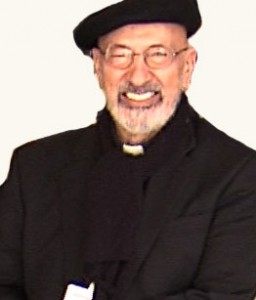
[powerpress]
Msgr. Esseff discusses his retreat with The Daughters of Mary, Mother of Healing Love community which meets the needs of the children brought to the St. Charles Children’s Home located in New Hampshire. Â He speaks of their work and the need to step out in courage to share the Divine Love which is needed to heal the deepest wounds of the heart. Â He talks about Mother Paul Marie, foundress of this new community, as well as Servant of God Fr. Flannagan, and Bl. Mother Teresa. Â Msgr. Esseff  talks about the importance of the both the male and female healthy role models in the lives children.
talks about the importance of the both the male and female healthy role models in the lives children.
The mission of The Daughters of Mary, Mother of Healing Love:
We founded the Daughters of Mary Mother of Healing Love to bring the healing love of Jesus to those who are suffering, and in a special way to families. Our primary apostolate at the present time is the St.Charles Children’s Home, where we care for children from troubled families.
For more on the work of the Sisters click here
Msgr. John A. Esseff is a Roman Catholic priest in the Diocese of Scranton. He was ordained on May 30th 1953, by the late Bishop William J. Hafey, D.D. at St. Peter’s Cathedral in Scranton, PA. Msgr. Esseff served a retreat director and confessor to Blessed Mother Teresa.   He continues to offer direction and retreats for the sisters of the missionaries of charity around the world. Msgr. Esseff encountered St.  Padre Pio,  who would become a spiritual father to him. He has lived in areas around the world,  serving  in the Pontifical missions, a Catholic organization established by Bl. Pope John Paul II to bring the Good News to the world especially to the poor. Msgr. Esseff assisted the founders of the Institute for Priestly Formation and continues to serve as a spiritual director for the Institute. He continues to  serve as a retreat leader and director to bishops, priests and sisters and seminarians and other religious leaders around the world. Â
To obtain a copy of Msgr. Esseff’s book byvisiting here
Be sure to visit Msgr. Esseff’s website “Building a Kingdom of  Love”
Tags: blessed mother teresa, catholic, catholic podcast, catholic prayer, cathollc spirituality, children, daughters of mary mother of healing love, divine love, father flannagan, Jesus, retreat
This entry was posted on Thursday, May 10th, 2012 at 5:33 pm
You can follow any responses to this entry through the RSS 2.0 feed.
Cardinal Arinze  spoke with 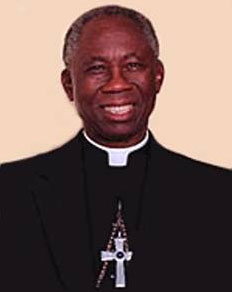 couples struggling with the challenge of infertility in Omaha on September 20, 2011.
couples struggling with the challenge of infertility in Omaha on September 20, 2011.
[powerpress]We apologize for some of the noise in the recording. Â The microphone was inadvertently attached to a file on the podium and was jostled during the talk…it’s not that bad and the talk is fantastic!
Francis Cardinal Arinze discussed the value of the marriage relationship and it’s contribution to the personal growth of the couple, it’s activity in the community and in the life of the Church.  Cardinal  Arinze goes on to talk about motherhood and fatherhood even when a couple do not have natural children of their own.  The joy of giving, as opposed to grabbing…the gift of joy.  He speaks of the example of priesthood and of St. Teresa of Calcutta (” The Smile of God”).  “Sacrificing yourself for others the sun begins to shine”.
Event sponsored by the Pro Sanctity Movement
Tags: Cardinal Arinze, catholic, catholic podcast, catholic prayer, catholic social teaching, cathollc spirituality, children, family life, Francis Cardinal Arinze, infertility, ivf, marriage
This entry was posted on Wednesday, September 21st, 2011 at 10:34 am
You can follow any responses to this entry through the RSS 2.0 feed.
In “Parenting Your Adult Child”, Susan Vogt has offers solid advice and counsel on how to address the challenges of spiritually parenting our adult children.: how to respect and nurture the faith that lies deep within each young adult, no matter what it looks like on the surface. Â Susan draws form the virtues to help along the sometimes bumpy path. The virtues she identifies are not the only ones that can help parents deepen their own spirituality, but they are especially relevant to forming new relationships with those you love.
to address the challenges of spiritually parenting our adult children.: how to respect and nurture the faith that lies deep within each young adult, no matter what it looks like on the surface. Â Susan draws form the virtues to help along the sometimes bumpy path. The virtues she identifies are not the only ones that can help parents deepen their own spirituality, but they are especially relevant to forming new relationships with those you love.
You can find more about Susan’s book here.
Tags: Adult Child, catholic, catholic podcast, catholic prayer, cathollc spirituality, children, parenting, st. anthony messenger books, Susan Vogt, virtues
This entry was posted on Thursday, May 12th, 2011 at 4:41 pm
You can follow any responses to this entry through the RSS 2.0 feed.
The Pope of the Blessed Sacrament
“Itching Ears Among Us
Saint Pius X exemplified the words of the Apostle to Timothy: “Preach the word, be urgent in season and out of season, convince, rebuke, and exhort, be unfailing in patience and in teaching. For the time is coming when people will not endure sound teaching, but having itching ears they will accumulate for themselves teachers to suit their own likings, and will turn away from listening to the truth and wander into myths†(2 Tim 4:2–4). One hundred years after Pope Saint Pius X we have to ask ourselves if there are not still “itching ears†among us.
What causes one’s ears to itch? Curiosity. Lack of discernment. A weak background in Catholic doctrine. Faithful Catholics cannot permit themselves to read just anything. To read authors of dubious orthodoxy or authors critical of the Magisterium is like scratching an itch. It becomes worse. Why would one would even want to read such authors when one can choose from among the inexhaustible richness of the writings of the saints of every age?
It was Saint Pius X who opened Holy Communion to little children. He invited the Catholic faithful to frequent, even daily Holy Communion. Pius X came to be known as the “Pope of the Eucharist,†a title that he now shares with Pope John Paul II, the author of Ecclesia de Eucharistia and of Mane Nobiscum, Domine.” – for more go to Vultus Christi
I see that serious face of the young boy to the right, and I wonder what he is thinking. His family was so poor. Giuseppe Melchiorre Sarto was born in 1835, the second of ten children. His father was the village postman. Though poor, his parents valued education and made every effort in securing that gift for their children.
Pope Pius was a Marian Pope, whose encyclical Ad Diem Illum expresses his desire through Mary to renew all things in Christ, which he had defined as his motto in his first encyclical. Pius believed that there is no surer or more direct road than by Mary to achieve this goal (no wonder he had such a beautiful heart). Pius X was the only Pope in the 20th century with extensive pastoral experience at the parish level, and pastoral concerns permeated his papacy; he favoured the use of the vernacular in catechesis. Frequent communion was a lasting innovation of his papacy. He spoke plainly and with strength, and because of that he was not well like by the elite and the rich.  He often referred to his own humble origins, taking up the causes of poor people. I was born poor, I have lived poor, and I wish to die poor
This is a wonderful prayer by the saint himself:
O Lord Jesus Christ, let Your passion be my strength to sustain, guard, and protect me. Let Your wounds be my food and drink to nourish, fill, and invigorate me. Let the shedding of Your Blood cleanse me of all my sins. Let Your death obtain eternal life for me and Your cross lead me to everlasting glory. Let these constitute for me refreshment and joy, health and uprightness of heart.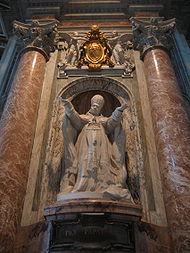 Â Â Amen.
  Amen.
Tags: Ad Diem Illum, catholic, catholic doctrine, catholic podcast, catholic prayer, cathollc spirituality, children, eternal life, holy communion, pope saint pius x
This entry was posted on Saturday, August 21st, 2010 at 7:03 am
You can follow any responses to this entry through the RSS 2.0 feed.

